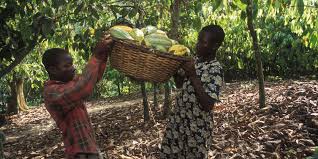The Ghana Cocoa Board (COCOBOD) hopes to ride on the back of success from its improved yields initiatives to attract the youth into cocoa farming. It believes interventions rolled out in the past few years are resulting in the reversal of cocoa farms depleting across the country.
Speaking at the maiden GIPC Cocoa Value Chain Investment Meeting, co-hosted by The Gauteng Growth and Development Agency Gauteng Growth, a Deputy Chief Executive Officer at COCOBOD, Dr. Emmanuel Opoku, said a lot of conscious effort is going into ensuring that improved yields are realised by farmers across the country; a situation that will make them richer.
He said the adoption of good agronomic practices – such as the application of fertilizers, shade management, mistletoe removal, weeding, and pest and disease control – is accounting for the yield increase.
“I was once transferred to manage our pre-harvest centres: the CEO called me one day and asked if we can do cocoa pollination across the country, and I said yes even though at the time we were only doing pollination in our seed gardens.
“But we started the pilot project, and we were very successful. We moved on to pruning, intensive fertilization, and irrigation, and the results have been successful. We have put in place effective measures to ensure consistent production of high yields.
“With these measures put in place, today a farmer can get 36 bags of cocoa on a one-acre land; so imagine the number of bags on five or more acres. With the price for a bag of cocoa, what business will give you this high a return on investment?” Dr. Opoku asked.
He added that all these are expected to culminate in assuring the consistent provision of the cocoa beans to support local investments that will go into processing and marketing the commodity.
Yields from cocoa have dwindled over the years due to a number of challenges, including, disease-attacks and illegal mining activities at cocoa farms in the Ashanti, Western and Eastern Regions. Cashew and Rubber companies also offer cocoa farmers attractive incentives to go into cashew and rubber plantations, since they are mostly overburdened with huge operational costs.
Dr. Opoku believes that when the youth are exposed to the value of improved yields, a lot more of them will devote more attention to cocoa farming.
Investment Meeting
The maiden GIPC cocoa value chain investment meeting, titled ‘Ghana’s Brown Gold: Sustaining Investments and Leveraging AfCFTA’, also focused on investment opportunities in the cocoa industry and its entire value chain. It also sensitized industry players to the valuable commercial opportunities offered by the African Continental Free Trade Agreement (AfCFTA).
With leading stakeholders such as the Ghana Cocoa Board (COCOBOD), the Cocoa Value Addition Artisans Association of Ghana (COVAAAGH), and Niche Cocoa Industry Ltd., the deliberations centred on policy interventions being rolled out by the government to foster growth in the sector, and how the cocoa business can be further enhanced.
Generating roughly US$2 billion annually in foreign exchange, cocoa continues to play an important role in Ghana’s economy as a major contributor to government revenue. The industry employs approximately 800,000 farming families and has exponentially expanded economic activities in the rural communities of Ghana.








